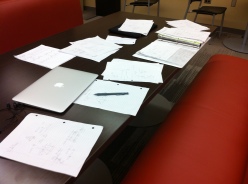4 Tips on Increasing Your Productivity
I remember the summer before my freshman year, I did a decent amount of reading on preparing for college. I probably read three or four books on this topic, and each contained a section on being productive in school. Funny enough, the more I read, the more I became increasingly frustrated because they all suggested vastly different study habits.
One author said to never ever take a nap during the day. Another said to master the art of power napping. Hmm…..

One author said to study all the way up until it is time to go to sleep. Another said it’s best to have all your schoolwork done by 5:00pm each say. Uh…. ok…..
I felt like I wasn’t learning anything. What one author said would maximize productivity, the other would say hinders it. Was I missing something?
The more I’ve thought about it, the more I’ve realized that they’re all right. There’s no one right way to work productively. At UGA, I’ve met plenty of extremely bright students who work with both excellence and efficiency, but they all go about it in a slightly different way. And that’s ok. In fact, I’d be worried if there was only one cookie-cutter method to studying effectively.
With that in mind, here are four general ideas I’ve found helpful in increasing productivity, regardless of how you are wired. None of it is backed by research or data—it’s just what I’ve found to be helpful.
1) Know your working style.
I think working productively starts by understanding how you work—how you go about getting stuff done. Think back on some of your best work—the work you are most proud of. How was it accomplished? Alone or in a group? Did you take two weeks and chip away at it little by little, or did you take eight straight hours and knock it out. Are you are marathoner, who works slowly throughout an entire day? Or are you a sprinter (like me) who takes three hours to go full out on schoolwork and it’s zipped away in the backpack afterwards. There’s no one right way to study. Heck, if pulling all nighters brings out your best work, go for it (although I can’t personally make an argument for this style). Know your working style and play to those strengths.
2) Find an environment where you are most productive.
This is critical. Even if you know how you work, you may not be maximizing your productivity if you are not in an environment that fosters that particular working style. Do you work best alone in your room, or at the library with people all around? Do you need dead silence or a more talkative environment? Is your focus greater in the morning, afternoon, or evening?
What ever that environment is, make sure you’re there when it’s time to work. It’s tremendously frustrating to work in an environment that hinders your focus.
Personally, I’ve found myself to be most productive when I am at the SLC (one of the student centers on campus) in the morning with a steaming cup of coffee. My mind tends to be fresher in the morning, and I have more willpower to tackle bigger tasks. Having other people around me studying also gives me a certain level of accountability. When I’m in an environment where everyone around me is focused on school, I tend to be more focused as well. For this very reason, I’ve found that I’m least productive when I’m alone, as I get easily distracted by web browsing, social media, etc. But that’s just me. What type of environment does your work thrive in?
3) Set a goal for each study session.
If you’re anything like me, I tend to look at the big-picture of everything I have to do that week and can become easily overwhelmed with everything going on. I tend to look at the 30,000ft view, rather than breaking it down into steps. Whether you’re big-picture or detailed oriented, set a small goal each time you sit down to study. Small goals help you press towards the larger goal and keep you focused while you’re at it. Whatever the task is, just take the next step.
4) Turn off your phone.
If there ever was a one-size fits all, universal study tip for the millennial generation, I guarantee you this is it. And I’m totally preaching to myself here. I have never heard someone say that keeping their phone on increases their productivity. Some may become more easily distracted than others when it comes to social media, texts, etc, but turning off your phone will certainty never hurt your efficiency. It can only help. Don’t think I kidding myself though. I know communication is important. I often need to send texts or make a call when I’m in the middle of studying, so I usually go for thirty minutes to an hour with my phone off, then take a quick break to send a text or whatever I need to do. You obviously don’t need to have it off all day, but in times of critical thinking, limiting distractions can be invaluable.
See if these four ideas make a difference for you this fall!



